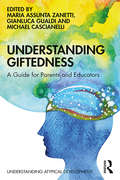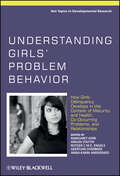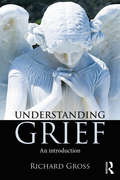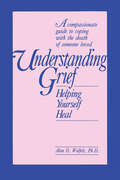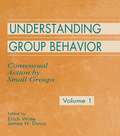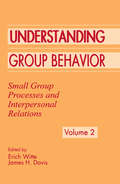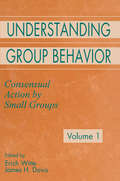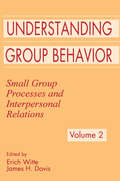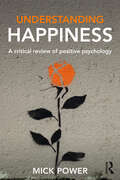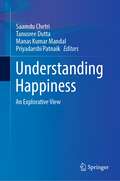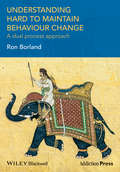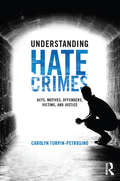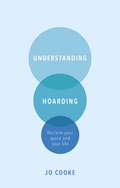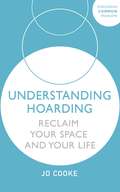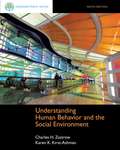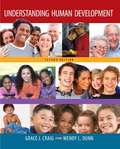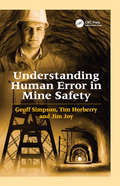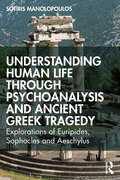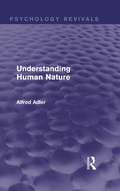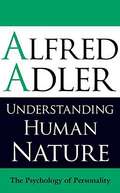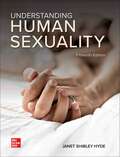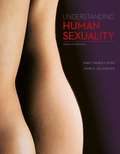- Table View
- List View
Understanding General Deterrence
by Stephen L. QuackenbushThis book bridges the divide between formal and quantitative studies of deterrence by empirically testing and extending perfect deterrence theory. The author focuses on general deterrence, which relates to managing relations between states at all times, not only during crises.
Understanding Giftedness: A guide for parents and educators (Understanding Atypical Development)
by Gianluca Gualdi Maria Assunta Zanetti Michael CascianelliThis concise, accessible guide explores the different models behind the concept of giftedness, examining the criteria for evaluating and identifying gifted children, in order to provide a deeper understanding of the lives of children and young people with high cognitive potential. It offers practical advice to parents and teachers, highlighting common queries and misconceptions and presenting evidence-based suggestions for management methods. Key topics covered include the difference between being gifted and talented, how to identify a gifted child, neurological differences between gifted children and their peers, dealing with perfectionism, and the best ways to parent and teach a gifted child. Avoiding prescriptive rules, the authors emphasise the importance of knowing and understanding the individual child whilst utilising research around giftedness to promote the best possible outcomes. Illustrated with case studies of student and teacher perspectives, the book offers an inclusive perspective and practical strategies, whereby the development of individual potential is viewed not only as a way to promote the psychological well-being of the individual but also as an opportunity and benefit for society. Understanding Giftedness is essential reading for parents and caregivers, as well as practitioners in clinical and educational psychology, counselling, mental health, nursing, child welfare, public healthcare and those in education who want to help young people develop their talents and achieve their full potential.
Understanding Girls' Problem Behavior
by Anna-Karin Andershed Margaret Kerr Håkan Stattin Geertjan Overbeek Rutger C. EngelsUnderstanding Girls' Problem Behavior presents an overview of recent studies by leading researchers into key aspects of the development of problem behavior in girls.Integrates interdisciplinary research into girls' problem behaviors (e.g. aggression, antisocial behavior, rule breaking)Unique in seeking to understand girls' problem behaviors in their own rightFollows the maturing girl from adolescence to adulthood, concluding at the point where she herself becomes a parent and forms new relationshipsGives attention to the critical contexts of problem behavior development--society and neighborhood, as well as family and peer contexts
Understanding Grief: An Introduction
by Richard GrossUnderstanding Grief is a comprehensive and accessible 'one stop' introduction to all the major models of grief. In addition to the individual perspective, bereavement is discussed in relation to social, cultural and religious factors and influences. Richard Gross also examines the impact of different types of bereavement, such as the death of a child, parent, spouse/partner, and sibling, and discusses the impact of traumatic death in relation to complicated grief. The text also covers pet loss, death anxiety, and post-traumatic growth. This innovative book combines personal accounts of grief with clinical accounts of patients provided by psychiatrists and psychologists, and research involving large numbers of bereaved individuals. Understanding Grief will be invaluable to all those working with bereaved clients, including bereavement counsellors, counselling and clinical psychologists, healthcare professionals, social workers, and the interested layperson. It is also suitable for people training to work with bereaved individuals.
Understanding Grief: Helping Yourself Heal (Understanding Your Grief Ser.)
by Alan WolfeltThis classic resource helps guide the bereaved person through the loss of a loved one, and provides an opportunity to learn to live with and work through the personal grief process.
Understanding Group Behavior: Volume 1: Consensual Action By Small Groups
by James H. Davis Erich H. WitteThese books grew out of the perception that a number of important conceptual and theoretical advances in research on small group behavior had developed in recent years, but were scattered in rather fragmentary fashion across a diverse literature. Thus, it seemed useful to encourage the formulation of summary accounts. A conference was held in Hamburg with the aim of not only encouraging such developments, but also encouraging the integration of theoretical approaches where possible. These two volumes are the result. Current research on small groups falls roughly into two moderately broad categories, and this classification is reflected in the two books. Volume I addresses theoretical problems associated with the consensual action of task-oriented small groups, whereas Volume II focuses on interpersonal relations and social processes within such groups. The two volumes differ somewhat in that the conceptual work of Volume I tends to address rather strictly defined problems of consensual action, some approaches tending to the axiomatic, whereas the conceptual work described in Volume II is generally less formal and rather general in focus. However, both volumes represent current conceptual work in small group research and can claim to have achieved the original purpose of up-to-date conceptual summaries of progress on new theoretical work.
Understanding Group Behavior: Volume 1: Consensual Action By Small Groups; Volume 2: Small Group Processes and Interpersonal Relations
by James H. Davis Erich H. WitteThese books grew out of the perception that a number of important conceptual and theoretical advances in research on small group behavior had developed in recent years, but were scattered in rather fragmentary fashion across a diverse literature. Thus, it seemed useful to encourage the formulation of summary accounts. A conference was held in Hamburg with the aim of not only encouraging such developments, but also encouraging the integration of theoretical approaches where possible. These two volumes are the result. Current research on small groups falls roughly into two moderately broad categories, and this classification is reflected in the two books. Volume I addresses theoretical problems associated with the consensual action of task-oriented small groups, whereas Volume II focuses on interpersonal relations and social processes within such groups. The two volumes differ somewhat in that the conceptual work of Volume I tends to address rather strictly defined problems of consensual action, some approaches tending to the axiomatic, whereas the conceptual work described in Volume II is generally less formal and rather general in focus. However, both volumes represent current conceptual work in small group research and can claim to have achieved the original purpose of up-to-date conceptual summaries of progress on new theoretical work.
Understanding Group Behavior: Volume 1: Consensual Action By Small Groups; Volume 2: Small Group Processes and Interpersonal Relations
by James H. Davis Erich H. WitteThese books grew out of the perception that a number of important conceptual and theoretical advances in research on small group behavior had developed in recent years, but were scattered in rather fragmentary fashion across a diverse literature. Thus, it seemed useful to encourage the formulation of summary accounts. A conference was held in Hamburg with the aim of not only encouraging such developments, but also encouraging the integration of theoretical approaches where possible. These two volumes are the result. Current research on small groups falls roughly into two moderately broad categories, and this classification is reflected in the two books. Volume I addresses theoretical problems associated with the consensual action of task-oriented small groups, whereas Volume II focuses on interpersonal relations and social processes within such groups. The two volumes differ somewhat in that the conceptual work of Volume I tends to address rather strictly defined problems of consensual action, some approaches tending to the axiomatic, whereas the conceptual work described in Volume II is generally less formal and rather general in focus. However, both volumes represent current conceptual work in small group research and can claim to have achieved the original purpose of up-to-date conceptual summaries of progress on new theoretical work.
Understanding Group Behavior: Volume 1: Consensual Action By Small Groups; Volume 2: Small Group Processes and Interpersonal Relations
by James H. Davis Erich H. WitteThese books grew out of the perception that a number of important conceptual and theoretical advances in research on small group behavior had developed in recent years, but were scattered in rather fragmentary fashion across a diverse literature. Thus, it seemed useful to encourage the formulation of summary accounts. A conference was held in Hamburg with the aim of not only encouraging such developments, but also encouraging the integration of theoretical approaches where possible. These two volumes are the result. Current research on small groups falls roughly into two moderately broad categories, and this classification is reflected in the two books. Volume I addresses theoretical problems associated with the consensual action of task-oriented small groups, whereas Volume II focuses on interpersonal relations and social processes within such groups. The two volumes differ somewhat in that the conceptual work of Volume I tends to address rather strictly defined problems of consensual action, some approaches tending to the axiomatic, whereas the conceptual work described in Volume II is generally less formal and rather general in focus. However, both volumes represent current conceptual work in small group research and can claim to have achieved the original purpose of up-to-date conceptual summaries of progress on new theoretical work.
Understanding Happiness: A critical review of positive psychology
by Mick PowerWe all want to be happy, and there are plenty of people telling us how it can be achieved. The positive psychology movement, indeed, has established happiness as a scientific concept within everyone's grasp. But is happiness really something we can actively aim for, or is it simply a by-product of how we live our lives more widely? Dr. Mick Power, Professor of Clinical Psychology and Director of Clinical Programmes at the National University of Singapore, provides a critical assessment of what happiness really means, and the evidence for how it can be increased. Arguing that negative emotions are as important to overall well-being as the sunnier sides of our disposition, the book examines many of the claims of the positive psychology movement, including the relationship between happiness and physical health, and argues that resilience, adaptability in the face of adversity, psychological flexibility, and a sense of generativity and creativity are far more achievable as life goals. This is a book which will fascinate anyone interested in positive psychology, or anyone who has ever questioned the plethora of publications suggesting that blissful happiness is ten easy steps away.
Understanding Happiness: An Explorative View
by Tanusree Dutta Manas Kumar Mandal Saamdu Chetri Priyadarshi PatnaikThis book provides a comprehensive and enriching understanding of the construct of happiness from diverse perspectives. It provides readers with an overview of the issues, problems, and challenges related to well-being and happiness. The book is divided into three sections. It brings together researchers and practitioners from various disciplines, including psychology, sociology, and development studies. Each section includes chapters from leading academicians from across the world. The first section helps the reader understand happiness from a neuroscientific perspective and explores the relationship between happiness and subjective well-being. The second section of the book discusses the importance of building personal resources for happiness from a positive psychology point of view. The last section examines the importance of happiness in the workplace and suggests a sustainable development plan for happiness. It is a must-buy book for individuals nurturing critical thought and searching for a quintessential understanding of happiness. It presents a unique contribution to the literature with its multidisciplinary focus on specific topics.
Understanding Hard to Maintain Behaviour Change
by Ron BorlandThe book presents an integrative theory of hard-to-maintain behaviours, that includes hard-to-reduce or eliminate behaviours like smoking and other drug use, overconsumption of food or unsafe sex, and hard-to-sustain behaviours like exercise and sun-safe behaviours. Most of the examples come from the author's work on tobacco smoking, but it is relevant to anyone who is concerned to understand why some forms of desirable behaviour are so hard to achieve, and to those trying to help people change. It also has important implications for public health campaigns and for the development of policies to nudge behaviour in desirable ways.The book provides readers with frameworks to:- Determine whether a "hard to maintain" behaviour is a result of the skills needed to perform it, its reinforcement history, the way the person thinks about it, the context, or some combination of these.- Better integrate cognitive and behavioural change strategies, including emergent strategies related to mindfulness and acceptance, plus novel ways of retraining operational processes.- Understand the different nature of challenges for behaviours where multiple attempts are typically required before the desired behaviour pattern is sustained.- Better understand the role of feelings and emotions as influences on behaviour.- Understand the limits of environmental factors to determine change.- Understand the limits of self-control and will-power.
Understanding Hate Crimes: Acts, Motives, Offenders, Victims, and Justice
by Carolyn Turpin-PetrosinoHate crimes and lesser acts of bigotry and intolerance are seen to be constants in today’s world. Since 1990, the federal government has published annual reports on hate crime incidents in the United States. While the reported numbers are disturbing, even more devastating is the impact of these crimes on individuals, communities, and society. This comprehensive textbook can serve as a stand-alone source for instructors and students who study hate crimes and/or other related acts. It invites the reader to consider relevant social mores and practices as well as criminal justice policies as they relate to hate crimes by presenting this subject within a broad context.
Understanding Hoarding
by Jo CookeHoarding can make life a misery for individuals and their families, affecting health and lifestyle, and posing a significant risk of fire and other dangers. Research suggests that 25% of accidental domestic fire deaths involve hoarding. Hoarding affects the whole family, making it difficult to receive social visits and in extreme cases, affecting living space and basic freedoms such as space in which to do homework or even sleep. Other challenges in hoarded homes can include restricted entry and exit, difficulties gaining access to gas and electricity areas, water leaks, mould, and rat and other infestations. Financial implications may include not having access to paperwork, leading to unpaid bills and other complications. Previously viewed as part of obsessive-compulsive disorder, hoarding disorder was recognised as a mental health disorder in its own right within the Diagnostic and Statistical Manual of Mental Disorders (DSM) in May 2013. This book aims to help those who are affected by hoarding difficulties, including friends and family. Topics include:What is Hoarding Disorder - the five diagnostic criteriaWhat triggers hoarding - abuse, bereavement, childhood issues, and so onWho can help a hoarder and how to helpHow to assess clutterWhy an intense clear-out doesn't workTaking steps to deal with it - an 8-step planWhere does my stuff go?Safeguarding - working with local councils and social servicesTherapies and resourcesCase histories
Understanding Hoarding: Reclaim your space and your life
by Jo CookeIf you are living with, are close to, or are yourself someone who is hoarding, you'll know that the disorder goes far deeper than most people realise, affecting the whole family and presenting huge challenges to the physical, mental, emotional and even financial wellbeing of anyone involved. Jo Cooke is Director of one of the UK's leading support services for people affected by hoarding and clutter, and has written this sensitive and empathetic book to help anyone experiencing hoarding difficulties. She gives insight into Hoarding Disorder - explaining what it is and, importantly, what it isn't - and what may trigger hoarding. There are strategies for how to assess the scale of situation and lay the groundwork to address it, and insights into who can help and how they can do it. An 8 step-plan gives practical steps to tackle the hoarding, supported by suggestions for what to do with the 'stuff', and advice on safeguarding - as well as techniques to support the hoarder as they attempt to stay clutter-free. There is space in the book for individuals and their own stories of hoarding, giving an empowering voice to people affected by the condition, and replacing the morbid curiosity that often accompanies it. With plenty of information on resources and therapies that can help, this is a warm and hugely practical guide that can only help anyone affected in any way by hoarding.
Understanding Hoarding: Reclaim your space and your life
by Jo CookeIf you are living with, are close to, or are yourself someone who is hoarding, you'll know that the disorder goes far deeper than most people realise, affecting the whole family and presenting huge challenges to the physical, mental, emotional and even financial wellbeing of anyone involved. Jo Cooke is Director of one of the UK's leading support services for people affected by hoarding and clutter, and has written this sensitive and empathetic book to help anyone experiencing hoarding difficulties. She gives insight into Hoarding Disorder - explaining what it is and, importantly, what it isn't - and what may trigger hoarding. There are strategies for how to assess the scale of situation and lay the groundwork to address it, and insights into who can help and how they can do it. An 8 step-plan gives practical steps to tackle the hoarding, supported by suggestions for what to do with the 'stuff', and advice on safeguarding - as well as techniques to support the hoarder as they attempt to stay clutter-free. There is space in the book for individuals and their own stories of hoarding, giving an empowering voice to people affected by the condition, and replacing the morbid curiosity that often accompanies it. With plenty of information on resources and therapies that can help, this is a warm and hugely practical guide that can only help anyone affected in any way by hoarding.
Understanding Human Behavior and the Social Environment (Cengage Learning Empowerment Series)
by Charles Zastrow Karen K. Kirst-AshmanZastrow and Kirst-Ashman's UNDERSTANDING HUMAN BEHAVIOR AND THE SOCIAL ENVIRONMENT, 10th Edition looks at the lifespan through the lens of social work theory and practice, covering human development and behavior theories within the context of family, organizational, and community systems. Using a chronological lifespan approach, the book presents separate chapters on biological, psychological, and social impacts at the different lifespan stages with an emphasis on strengths and empowerment. Part of the Brooks/Cole Empowerment Series, this edition is completely up to date and thoroughly integrates the core competencies and recommended practice behaviors outlined in the current Educational Policy and Accreditation Standards (EPAS) set by the Council on Social Work Education (CSWE).
Understanding Human Behavior and the Social Environment (Ninth Edition)
by Charles Zastrow Karen K. Kirst-AshmanZastrow and Kirst-Ashman's UNDERSTANDING HUMAN BEHAVIOR AND THE SOCIAL ENVIRONMENT looks at lifespan through the lens of social work theory and practice, covering human development and behavior theories within the context of family, organizational, and community systems. Using a chronological lifespan approach, the book presents separate chapters on biological, psychological, and social impacts at the different lifespan stages with an emphasis on strengths and empowerment. As part of the Brooks/Cole Empowerment Series, this edition is completely up to date and thoroughly integrates the core competencies and recommended practice behaviors outlined in the 2008 Educational Policy and Accreditation Standards (EPAS) set by the Council on Social Work Education (CSWE).
Understanding Human Development
by Grace Craig Wendy DunnFor undergraduate courses in Lifespan Development and Human Development. An interdisciplinary approach with an emphasis on culture and family. Using an interdisciplinary approach which emphasizes culture and family, Understanding Human Development challenges students to understand development from a broader perspective. Students draw on their own experiences as they weigh the research and ideas presented in the text.
Understanding Human Error in Mine Safety
by Tim Horberry Geoff SimpsonThe consideration of human factors issues is vital to the mining industry. As in other safety-critical domains, human performance problems constitute a significant threat to system safety, making the study of human factors an important field for improving safety in mining operations. The primary purpose of this book is to provide the reader with a much-needed overview of human factors within the mining industry, in particular to understand the role of human error in mine safety, explaining contemporary risk management and safety systems approaches. The approach taken is multidisciplinary and holistic, based on a model of the systems of work in the mining industry domain. The ingredients in this model include individual operators, groups/teams, technology/equipment, work organisation and the physical environment. Throughout the book, topics such as human error and safety management are covered through the use of real examples and case studies, allowing the reader to see the practical significance of the material presented while making the text rigorous, useful and enjoyable. Understanding Human Error in Mine Safety is written for professionals in the field, researchers and students of mining engineering, safety or human factors.
Understanding Human Life through Psychoanalysis and Ancient Greek Tragedy: Explorations of Euripides, Sophocles and Aeschylus
by Sotiris ManolopoulosDrawing parallels between ancient theatre, the analytic setting, and the workings of psychic life, this book examines the tragedies of Euripides, Sophocles, and Aeschylus through a psychoanalytic lens, with a view of furthering the reader’s understanding of primitive mental states.What lessons can we learn from the tragic poets about psychic life? What can we learn about psychoanalytic work from ancient tragedy and playwrights? Sotiris Manolopolous considers how the key tenets of ancient Greek theatre – passion, conflict, trauma, and tragedy – were focussed on because they could not be spoken of in daily life and how these restraints have continued into contemporary life. Throughout, he considers how theatre can be used to stage political experiences and shows how these experiences are a vital part of understanding an analysand within an analytic setting. Drawing on his own clinical practice, Manolopoulos considers what ancient playwrights might teach us about early, uncontained agonies of annihilation and primitive mental states that manifest themselves both within the individual and the collective experience of contemporary life, such as climate change denial and totalitarian politicians.Drawing on canonical works such as Hippolytus, Orestes, Antigone, and Prometheus Unbound, this book continues the legacy of research that shows how contemporary analysts, students, and scholars can learn from ancient Greek literature and apply it directly to those negatively impacted by the trauma of 21st-century life and politics.
Understanding Human Nature: The Psychology Of Personality (Psychology Revivals)
by Alfred AdlerOriginally published in 1928 this book was an attempt to acquaint the general public with the fundamentals of Individual Psychology. At the same time it is a demonstration of the practical application of these principles to the conduct of everyday relationships, and the organization of our personal life. Based upon a years’ lectures to audiences at the People’s Institute in Vienna, the purpose of the book was to point out how the mistaken behaviour of the individual affects harmony of our social and communal life; to teach the individual to recognize their own mistakes; and finally, to show them how they may effect a harmonious adjustment to the communal life. Adler felt that mistakes in business or in science were costly and deplorable, but mistakes in the conduct of life are usually dangerous to life itself. This book is dedicated by the author in his preface ‘to the task of illuminating man’s progress toward a better understanding of human nature.’
Understanding Human Nature: The Psychology of Personality (Psychology Revivals Ser.)
by Alfred Adler Colin BrettLong-regarded as the handbook of Individual Psychology, Understanding Human Nature provides an engaging introduction to Adler's key concepts including: inferiority and superiority complexes; life style; memories and dreams; love, marriage and children; and sexuality and sexual problems. Adler's holistic approach to the study of personality saw him challenge the dominance of Freud's thinking (his friend and colleague) and develop a truly innovative, and still highly relevant, method of psychoanalysis. A straightforward, clearly-written book, it shows the seminal thinking of a great mind and provides a basis to understand both Adler's unique theories and the development of twentieth-century psychology, in which his work has played such an important part.
Understanding Human Sexuality
by John Delamater Janet HydeSince its conception, Understanding Human Sexuality has achieved distinction and success by following the science of human sexuality. The first of the modern sexuality textbooks, Understanding Human Sexuality introduced this topic to students through the science that has uncovered what we know about the field. Groundbreaking when it first appeared, this research-based tradition continues to deliver a contemporary, balanced introduction to human sexuality in an integrated learning system that engages students in learning the content of the course, about others, and about themselves. The new Guide to Diversity, Equity, and Inclusion reflects the author's longstanding commitment to integrate issues of diversity with the latest scholarship.
Understanding Human Sexuality
by Janet Shibley Hyde John DelamaterHyde and DeLamater's Understanding Human Sexuality examines the biological, psychological, and sociological perspectives of human sexuality, providing practical information needed for everyday living, all with a firm grounding in research. The author team features a unique combination of a psychologist and a sociologist, which gives the program a distinct interdisciplinary perspective. The twelfth edition features a new emphasis on critical thinking skill development, with input from expert Diane Halpern to ensure clarity and accessibility for students.

